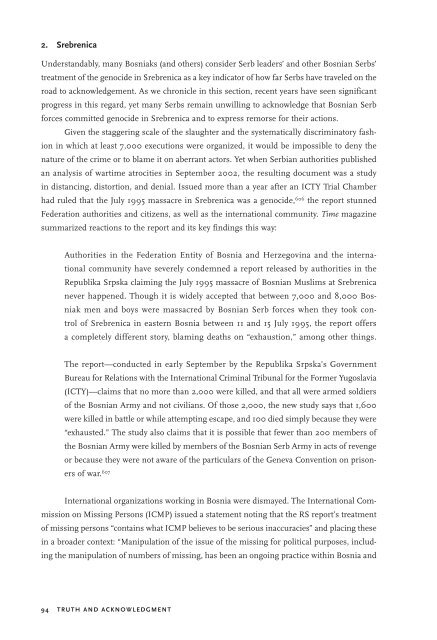That Someone Guilty Be Punished - International Center for ...
That Someone Guilty Be Punished - International Center for ...
That Someone Guilty Be Punished - International Center for ...
Create successful ePaper yourself
Turn your PDF publications into a flip-book with our unique Google optimized e-Paper software.
2. Srebrenica<br />
Understandably, many Bosniaks (and others) consider Serb leaders’ and other Bosnian Serbs’<br />
treatment of the genocide in Srebrenica as a key indicator of how far Serbs have traveled on the<br />
road to acknowledgement. As we chronicle in this section, recent years have seen significant<br />
progress in this regard, yet many Serbs remain unwilling to acknowledge that Bosnian Serb<br />
<strong>for</strong>ces committed genocide in Srebrenica and to express remorse <strong>for</strong> their actions.<br />
Given the staggering scale of the slaughter and the systematically discriminatory fashion<br />
in which at least 7,000 executions were organized, it would be impossible to deny the<br />
nature of the crime or to blame it on aberrant actors. Yet when Serbian authorities published<br />
an analysis of wartime atrocities in September 2002, the resulting document was a study<br />
in distancing, distortion, and denial. Issued more than a year after an ICTY Trial Chamber<br />
had ruled that the July 1995 massacre in Srebrenica was a genocide, 606 the report stunned<br />
Federation authorities and citizens, as well as the international community. Time magazine<br />
summarized reactions to the report and its key findings this way:<br />
Authorities in the Federation Entity of Bosnia and Herzegovina and the international<br />
community have severely condemned a report released by authorities in the<br />
Republika Srpska claiming the July 1995 massacre of Bosnian Muslims at Srebrenica<br />
never happened. Though it is widely accepted that between 7,000 and 8,000 Bosniak<br />
men and boys were massacred by Bosnian Serb <strong>for</strong>ces when they took control<br />
of Srebrenica in eastern Bosnia between 11 and 15 July 1995, the report offers<br />
a completely different story, blaming deaths on “exhaustion,” among other things.<br />
The report—conducted in early September by the Republika Srpska’s Government<br />
Bureau <strong>for</strong> Relations with the <strong>International</strong> Criminal Tribunal <strong>for</strong> the Former Yugoslavia<br />
(ICTY)—claims that no more than 2,000 were killed, and that all were armed soldiers<br />
of the Bosnian Army and not civilians. Of those 2,000, the new study says that 1,600<br />
were killed in battle or while attempting escape, and 100 died simply because they were<br />
“exhausted.” The study also claims that it is possible that fewer than 200 members of<br />
the Bosnian Army were killed by members of the Bosnian Serb Army in acts of revenge<br />
or because they were not aware of the particulars of the Geneva Convention on prisoners<br />
of war. 607<br />
<strong>International</strong> organizations working in Bosnia were dismayed. The <strong>International</strong> Commission<br />
on Missing Persons (ICMP) issued a statement noting that the RS report’s treatment<br />
of missing persons “contains what ICMP believes to be serious inaccuracies” and placing these<br />
in a broader context: “Manipulation of the issue of the missing <strong>for</strong> political purposes, including<br />
the manipulation of numbers of missing, has been an ongoing practice within Bosnia and<br />
94 TRUTH AND ACKNOWLEDGMENT

















